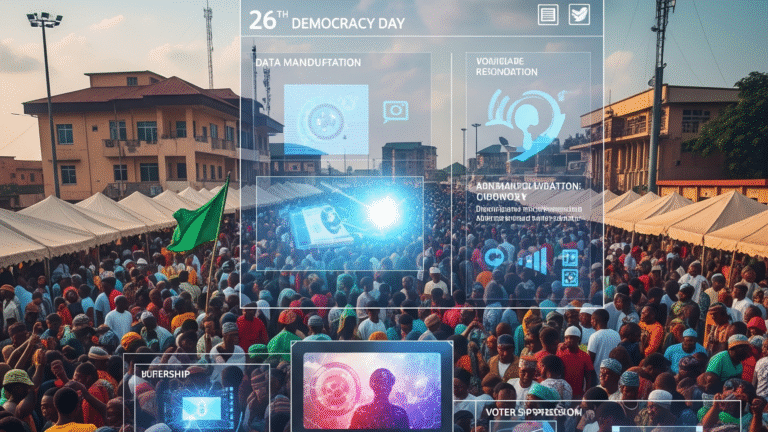As Nigeria marks 26 years of uninterrupted civilian rule, Democracy Day 2025 is both a celebration and a sobering reflection. While democracy has endured, its integrity is increasingly tested in the digital age.
Notably, technology, known for enabling transparency and civic engagement, can also be used to suppress dissent, surveil citizens, and disrupt citizens’ freedom, democratic processes and the tenets of democracy.
Over the past five years, from internet blackouts to surveillance and social media crackdowns, the Nigerian government has repeatedly leveraged technology in ways that have compromised digital rights and democratic principles.

In this article, I have recapitulated 10 notable incidents between 2020 and 2025 where technology was employed by the Nigerian government at the expense of the rights of the people and to endanger democracy.
1. #EndSARS internet shutdown and digital surveillance (October 2020)
Amid the nationwide #EndSARS protests against police brutality, the Nigerian government imposed a near-total internet blackout, one of the longest in its history. Protesters lost access to real-time information, limiting transparency and media coverage.
Following the protests, reports emerged of facial recognition, call metadata analysis, and social media monitoring used to track and intimidate activists, often without due process.
2. Twitter (X) ban (June 2021–January 2022)
After Twitter deleted a tweet by then-President Muhammadu Buhari referencing the Civil War, the government suspended the platform. The seven-month ban blocked millions from a key space for political discourse.
Lifting the ban came with new conditions: Twitter had to open a local office and comply with stricter regulations. The episode marked a dangerous precedent for internet censorship in Nigeria.
3. Mandatory NIN-SIM linkage and digital exclusion (2021–2023)
Framed as a national security measure, the government’s policy requiring all SIM cards to be linked to a National Identification Number (NIN) led to millions, especially in rural or underserved areas, being disconnected from mobile networks.
In a country where mobile phones are essential for communication, finance, and civic engagement, this move disenfranchised the digitally vulnerable.
4. Election-era internet disruptions (2023 General Elections)
During Nigeria’s 2023 general elections, internet blackouts were reported in opposition strongholds. Civil society groups, including the Centre for Democracy and Development (CDD), condemned the outages as deliberate digital voter suppression.

Though the government denied involvement, the pattern and timing raised serious concerns about electoral integrity and democratic manipulation.
5. BVAS and IReV failure (2023 Elections)
The Independent National Electoral Commission (INEC) introduced the BVAS (Bimodal Voter Accreditation System) and the IReV results portal to enhance transparency.
However, widespread technical glitches and inconsistent result uploads from polling units eroded public trust in the election results and the credibility of INEC.
6. Pegasus spyware for surveillance (2022)
In 2022, investigative reports revealed that Nigerian security agencies had allegedly acquired the Pegasus spyware, a powerful surveillance tool capable of infiltrating smartphones.
It was reportedly used to monitor activists, opposition figures, and journalists, infringing on civil liberties and violating international norms.
7. Coordinated online disinformation campaigns (2023–2024)
During the election cycle, analysts discovered state-linked networks of bots and fake accounts spreading disinformation aimed at discrediting opposition parties and civil society groups.
This deliberate manipulation of public opinion through digital propaganda weakened democratic dialogue and inflamed political polarisation.
8. Internet throttling during #EndBadGovernance Protests (August 2024)
Civil society organisations documented nationwide internet throttling during the August 2024 #EndBadGovernance protests. Slowed internet speeds disrupted mobilisation and public awareness.

Thirty-six advocacy groups denounced the move as a violation of constitutional rights to free expression and peaceful assembly.
9. The controversial Social Media Bill (2023–2024)
After the Twitter ban, the government proposed a sweeping social media regulation bill that critics likened to “digital autocracy”. The bill would empower agencies like the NCC and NBC to shut down platforms or prosecute users for undefined “misinformation”.
Though not passed into law as of 2025, the bill signalled a clear intent to curb online freedoms and dissent.
10. Expanded surveillance powers under the Cybercrimes Act (2025 Amendments)
In early 2025, amendments to Nigeria’s Cybercrimes Act significantly expanded the government’s powers to monitor digital communications under the guise of national security.
Civil society groups raised alarms over the vague language and lack of oversight, warning that it could lead to abuse of power, political targeting, and suppression of lawful dissent.
Technology: A double-edged sword for Nigerian democracy
These ten incidents highlight how digital tools can be weaponised by governments to erode democratic norms, silence critical voices, and entrench power.

Yet, they also reveal the resilience of Nigeria’s digital public sphere, where activists, journalists, and citizens continue to challenge overreach and demand accountability.
What Must Be Done?
- Legal safeguards to protect digital rights
- Independent oversight of government tech use
- Digital literacy to help citizens identify manipulation
- International solidarity to deter authoritarian impulses
As we commemorate Democracy Day 2025, it is clear that the future of democracy in Nigeria depends on who controls the tech and how. Democracy is not just a ballot box; it is a system of rights, responsibilities, and resistance, online and offline.


